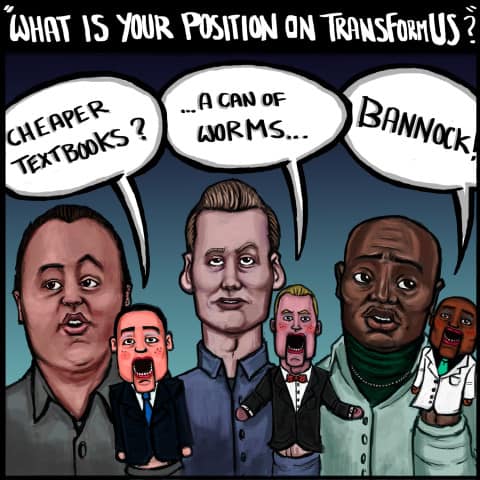 The University of Saskatchewan Students’ Union has just completed its elections for the 2014–15 executive, but I’m still wondering what platforms the successful candidates were actually elected on.
The University of Saskatchewan Students’ Union has just completed its elections for the 2014–15 executive, but I’m still wondering what platforms the successful candidates were actually elected on.
Buzzwords are used to impress so it’s no surprise this year’s USSU candidates all embraced certain slogans to create campaigns and to answer questions without ever really telling students what it is that they plan to do.
While I did not attend all of the forums, the ones that I did attend were frustrating in several respects. The primary one being that candidates would be asked a question but would never actually answer it. I know it’s very difficult to give an appropriate answer when you’re asked a question on the spot, but throwing out buzzwords is not what the voting body needs or wants to hear.
Aside from the forums, the only other opportunity there was to hear from candidates was from their videos posted on the USSU website or through their individual Facebook pages.
You’d think that candidates would expand on what they say in their videos when asked questions at forums, but for the most part each candidate had their list of buzzwords that they produced to answer questions. This made them sound like they had some kind of clue as to what they were planning to do if elected but left many students at these forums without the answers necessary to make an informed decision at the ballot.
Phrases like “progress,” “student voices,” “engagement,” “positive changes,” “better resources” and “accessibility” were thrown around by all of the running candidates, but I still haven’t a clue what any of these words really mean to them. What does it actually mean to have “better resources” for students or increased “accessibility” — as promoted by both candidates who ran for vice-president operations and finance?
Such words and phrases sound great, but how is it all going to be achieved? Maybe it’s too much to ask that candidates actually do some research into how they would achieve these “positive changes,” but I think that’s a necessity if you want to be taken seriously in the political realm.
A really low moment for me was at the first forum held at Louis’ on March 18. A student from the audience asked both presidential candidates how they intended to approach Aboriginal engagement, enrolment and other services on campus. David Ogunkanmi responded in such a way that allowed him to never actually answer the question.
In response to the question, Ogunkanmi told the forum how he lived with an Aboriginal family when he first came to Canada and how he’s eaten bannock. He basically told the audience that he’s accepting of Aboriginal students and welcomes them with open arms — but never truly addressed the question.
As an audience member I interpreted his answer as, “I have Aboriginal friends and that shows I will seek better services for them on campus.” Telling us that you’ve eaten bannock does not mean you know how to address Aboriginal issues on our campus — it only shows that you like bannock. This has absolutely nothing to do with an election.
Elias Nelson said in his video for vice-president operations and finance, “TransformUS: it’s complicated, it’s controversial, it’s a can of worms.” Well, yes, Nelson, TransformUS certainly is all of those things — but what are you going to do about it?
Each candidate probably could have answered most of the questions at the forums with the simple response of, “TransformUS is bad.” That likely would have warranted a tremendous round of applause, later accompanied by a win in the election no doubt.
The fact of the matter is that true voters in a democracy want to hear the plans of their future leaders. They don’t need to hear buzzwords that are essentially empty commentaries meant to impress.
Frankly, all the candidates running for USSU positions in the future should want to engage students, increase communication with them and create positive changes, all the while being an advocate for students’ needs. All of this really shouldn’t have to be said over and over again.
However, some candidates did give worthwhile answers to questions when asked by keen students who care about student governance. I thank all of the candidates for any substantial answers they provided during the course of their campaign.
Next year I hope that USSU candidates will move beyond the obvious and actually challenge themselves to have an action-based platform. Students want results and actions, not buzzwords to provide a false sense of comfort.
—
Graphic: Pascal Dimnik
Leave a Reply